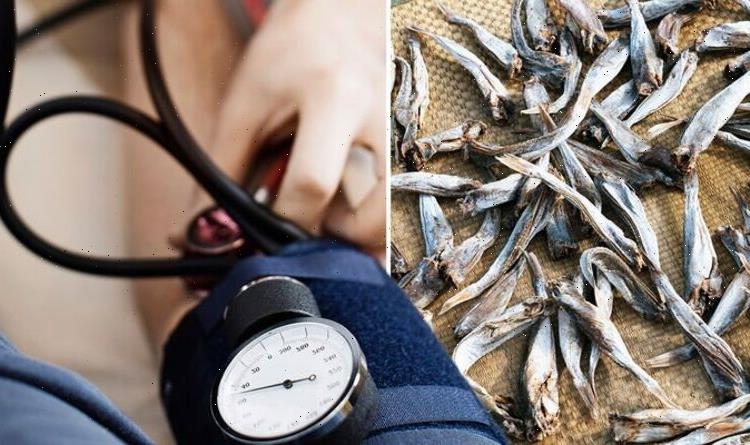High blood pressure: Lifestyle changes to reduce reading
We use your sign-up to provide content in ways you’ve consented to and to improve our understanding of you. This may include adverts from us and 3rd parties based on our understanding. You can unsubscribe at any time. More info
Your blood pressure rises in response to poor lifestyle decisions. While this mechanism may seem harmless, consistently high blood pressure puts pressure on your heart, thereby raising your risk of heart disease. Certain lifestyle decisions are obvious but there are also some that present hidden health risks.
One surprising dietary item to watch is dried fish.
Dried fish are particularly high in salt so you “should try to avoid them or find a lower-salt version”, advises Blood Pressure UK.
Drying fish is a method of food preservation that works by removing water from the fish, which gives it a storage life of several years.
How does salt raise your blood pressure?
Blood Pressure UK explains: “Salt makes your body hold onto water. If you eat too much, the extra water in your blood means there is extra pressure on your blood vessel walls, raising your blood pressure.”

Fish is not all bad, however.
On the contrary, researchers have found that oily fish, such as mackerel, salmon, sardines or mussels, could help protect our hearts and brains from disease.
“They are found to be rich in an important type of polyunsaturated fat called omega-3, which has been shown to help lower blood pressure,” explains the British Heart Foundation (BHF).
The BHF continues: “Combining oily fish, as part of a traditional Mediterranean style diet, will give your body the best chance of staving off disease.”
DON’T MISS
Cancer symptoms: The ‘persistent’ sign when waking up [INSIGHT]
Dementia: The smelly warning sign to spot [TIPS]
Lung cancer: The sign on your fingernails – Dr Amir [ADVICE]
A Mediterranean diet incorporates the traditional healthy living habits of people from countries bordering the Mediterranean Sea, including France, Greece, Italy and Spain.
The Mediterranean diet varies by country and region, so it has a range of definitions.
But in general, it’s high in vegetables, fruits, legumes, nuts, beans, cereals, grains, fish, and unsaturated fats such as olive oil. It usually includes a low intake of meat and dairy foods.
Some studies have reported that food typical of the Mediterranean diet, such as whole grains, vegetables, fruits, nuts, and extra virgin olive oil, have a favourable effect on the risk of hypertension.

Food not typical of this dietary pattern such as red meat, processed meat, and poultry has an unfavourable effect.
Exercise is also integral to blood pressure control.
The Mayo Clinic explains: “Regular physical activity makes your heart stronger. A stronger heart can pump more blood with less effort.
“As a result, the force on your arteries decreases, lowering your blood pressure.”

As the health body notes, regular exercise also helps you maintain a healthy weight — another important way to control blood pressure.
Getting tested
The only way of knowing whether you have high blood pressure is to have a blood pressure test.
“All adults over 40 are advised to have their blood pressure checked at least every five years,” explains the NHS.
You can get your blood pressure tested at a number of places, including:
- At your GP surgery
- At some pharmacies
- As part of your NHS Health Check
- In some workplaces.
Source: Read Full Article






